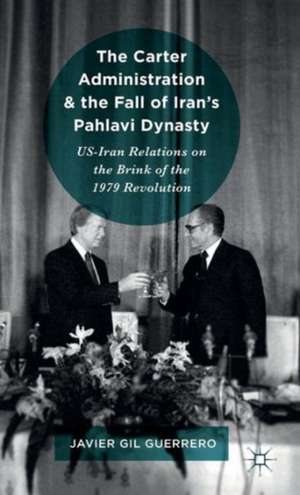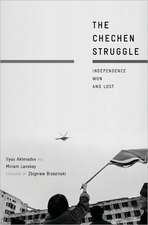The Carter Administration and the Fall of Iran’s Pahlavi Dynasty: US-Iran Relations on the Brink of the 1979 Revolution
Autor Javier Gil Guerreroen Limba Engleză Hardback – 6 apr 2016
Preț: 1094.49 lei
Preț vechi: 1334.74 lei
-18% Nou
Puncte Express: 1642
Preț estimativ în valută:
209.43€ • 218.66$ • 173.33£
209.43€ • 218.66$ • 173.33£
Carte tipărită la comandă
Livrare economică 05-19 aprilie
Preluare comenzi: 021 569.72.76
Specificații
ISBN-13: 9781137598714
ISBN-10: 1137598719
Pagini: 264
Ilustrații: XXVII, 264 p.
Dimensiuni: 140 x 216 x 18 mm
Greutate: 4.73 kg
Ediția:1st ed. 2016
Editura: Palgrave Macmillan US
Colecția Palgrave Macmillan
Locul publicării:New York, United States
ISBN-10: 1137598719
Pagini: 264
Ilustrații: XXVII, 264 p.
Dimensiuni: 140 x 216 x 18 mm
Greutate: 4.73 kg
Ediția:1st ed. 2016
Editura: Palgrave Macmillan US
Colecția Palgrave Macmillan
Locul publicării:New York, United States
Descriere
This book is a tale of loss: the loss of Iran as America's main ally and agent in the Middle East and the downfall of the short-lived Pahlavi monarchy and America's inability and unwillingness to prevent its demise. Khomeini's triumph altered America's perception of Islam and fundamentally changed its relationship with Iran.
Cuprins
Abbreviations Used in Citations
American, British and Iranian Actors
Introduction
1. Between Idealism and Realism: Carter's Foreign Policy
2. A Failed Atatürk: The Shah and Iran in 1977
3. Human Rights and Arms Exports
4. Weeping and Toasting
5. Khomeini's Shadow
6. The Match and the Wood: The Road to Revolution
7. The Revolution
8. Losing the initiative: The Paralysis in Washington and Tehran
9. Thinking the Unthinkable
10. End of an Era: The Triumph of the Revolution
American, British and Iranian Actors
Introduction
1. Between Idealism and Realism: Carter's Foreign Policy
2. A Failed Atatürk: The Shah and Iran in 1977
3. Human Rights and Arms Exports
4. Weeping and Toasting
5. Khomeini's Shadow
6. The Match and the Wood: The Road to Revolution
7. The Revolution
8. Losing the initiative: The Paralysis in Washington and Tehran
9. Thinking the Unthinkable
10. End of an Era: The Triumph of the Revolution
Recenzii
“Guerrero’s work is written well and documented thoroughly. The resources accessed are valuable in and of themselves. It is a welcome work to the political history of American-Iranian interaction.” (Philip O Hopkins, Iran and the Caucasus, Vol. 21 (1), 2017)
Notă biografică
Javier Gil Guerrero is a researcher at the Institute for Culture and Society, University of Navarra, Spain, and also a professor of contemporary history in the School of Communication. He has published several articles on US foreign policy in the Middle East and Islam.
Textul de pe ultima copertă
During the first two years of Carter's presidency, Iran entered a spiral of violence and unrest that ended with the exile of the Shah and the establishment of an Islamic Republic. The Iranian revolution was first neglected by American diplomats and intelligence officials. When Carter finally became aware of the extent of the disturbances in Iran, he refused to explicitly back the iron fist policy sought by the Shah. The Iranian monarch was unwilling to decisively tackle the protests without Carter's blessing and thus he proceeded with a failed policy that mixed concessions with repression, which only served to postpone the inevitable. This book looks at recent declassified documents from several archival resources that provide an unprecedented picture of the Carter administration's uneasiness regarding the Shah's Iran. Gil Guerrero analyzes the disputes between Washington and Tehran concerning human rights and arms exports, the divisions inside the White House, and the Shah's uncertainty regarding Carter's support. The sources gathered all point to a late process of political liberalization encouraged by American officials that only served to weaken the Shah's authority while emboldening the opposition, in the words of Ayatollah Khomeini, to 'seize the moment." They offer an unprecedented picture of the forces that enabled Khomeini's triumph, altered America's perception of Islam, and fundamentally changed the United States' relationship with Iran.
















